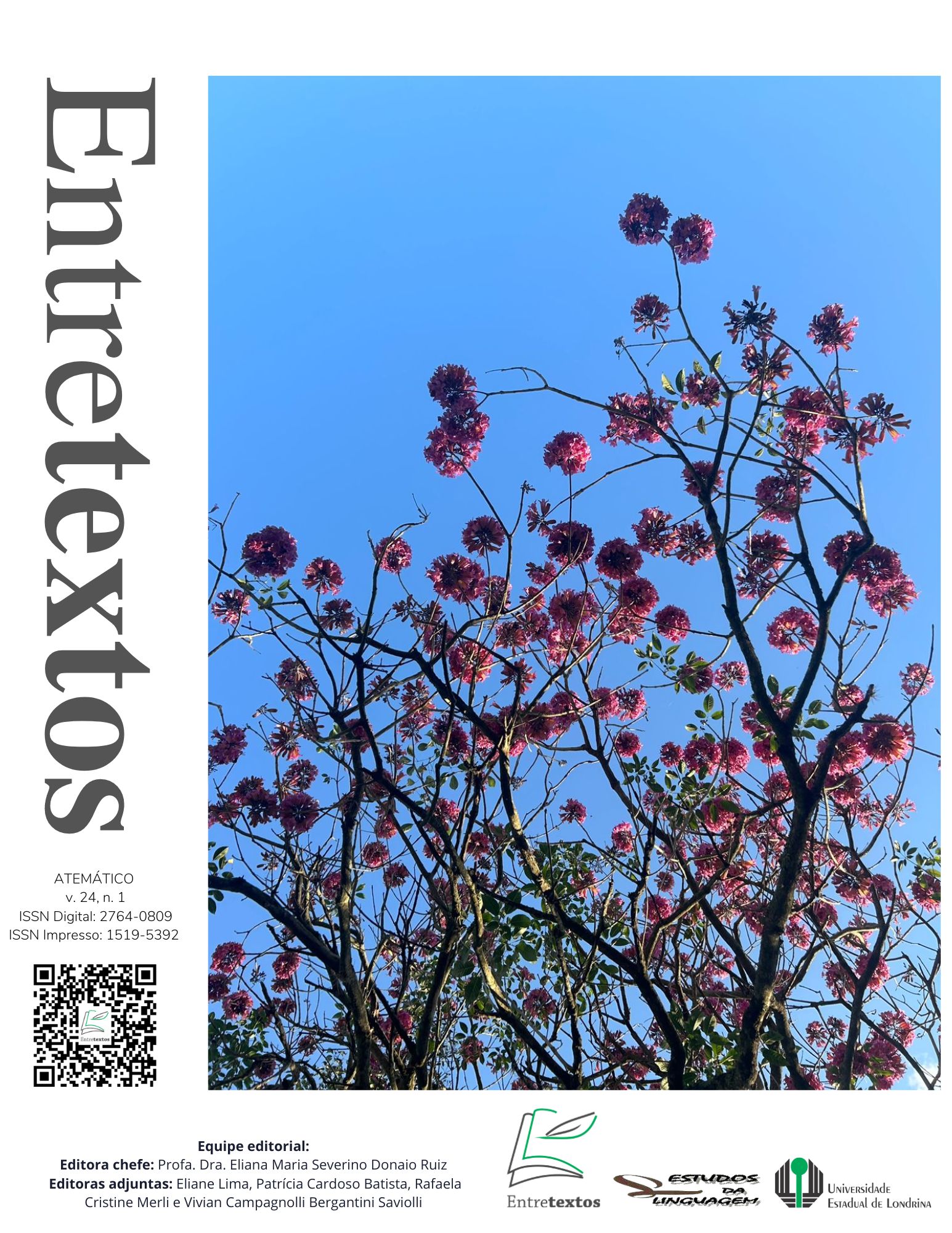The construction of the panel discursive genre: from different temporalities to compositional structure
DOI:
https://doi.org/10.5433/1519-5392.2024v24n1p172-195Keywords:
Panel discursive genre, Different temporalities, WritingAbstract
An assumption can be observed in pedagogical work with genre in teaching materials: the centralization of genre stability in teaching. From another perspective, there are practices that, although they recognize stability, focus on the situations in which utterances are produced and their socio-historical aspects. In this way, anchored in Bakhtin and the Bakhtin Circle, the analysis of a teaching practice of a genre emerging from a social situation is assumed. The objective is to analyze, in the corpus, a set of three proposals for writing the panel genre. The focus of observation will be the construction of the genre beyond the compositional structure with an emphasis on the dialogue with temporalities. To reinforce the investigation, three writing versions of the genre are also examined. From this perspective, we analyze possible work with writing aimed more at understanding how language practices occur in interaction processes than specifically with the textual materiality of the panel genre, assumptions defended by Bakhtin and the Bakhtin Circle.
Downloads
References
BAKHTIN, M.. Estética da criação verbal. São Paulo: Martins Fontes, 2010.
BAKHTIN, M. e VOLOSHINOV, V. N. Marxismo e filosofia da linguagem. São Paulo: Hucitec. 2006.
BAJTIN, M./VOLOSHÍNOV, V. La construcción de la enunciación. In. Silvestri, A; BLANK, G. Bajtín y Vigostki: la organización semiótica de la conciencia. Barcelona: Anthropos, 1993, p. 245-276.
BRASIL. Base Nacional Comum Curricular, Ensino Fundamental. Brasília: MEC, 2017.
BRASIL. Base Nacional Comum Curricular, Ensino Médio. Brasília: MEC, 2020.
BROCARDO; R. O.; ORTEGA, L. R.; LIMA, A. P.. A concepção de gênero discursivo subjacente na BNCC: aproximações e distanciamentos da perspectiva dialógica. In: COSTA-HÜBES, T.C.; KRAEMER, M.A.D. Uma leitura crítica da Base Nacional Comum Curricular: compreensões subjacentes. Campinas, SP, 2019, p. 95-124.
BRASIL. Secretaria de Educação Fundamental. Parâmetros Curriculares Nacionais: terceiro e quarto ciclos do ensino fundamental - língua portuguesa/ Secretaria de Educação Fundamental. Brasília: MEC/SEF, 1998.
CORRÊA, M.L.G. Bases teóricas para o ensino da escrita. Revista Linguagem em (Dis)curso, Tubarão, SC, v. 13, n. 3, p. 481-513, set./dez. 2013. DOI: https://doi.org/10.1590/S1518-76322013000300003
RODRIGUES, R. H. Análise de gêneros do discurso na teoria bakhtiniana: algumas questões teóricas e metodológicas. Linguagem em (Dis)curso, Tubarão, v. 4, n. 2, p. 415-440, jan./jun. 2004.
RODRIGUES, R. H. Articulações teórico-conceituais nos PCNS: uma análise crítica. Anais do 5º Encontro do Celsul, Curitiba-PR, 2003, p.1258 -1267.
ROJO, R. Gêneros do discurso e gêneros textuais: questões teóricas e aplicadas. In. Meurer, J.L.; BONINI, Adair; MOTTA-TOTH, Désirée. Gêneros: teorias, métodos, debates. São Paulo: Parábola, 2005, p.184-207.
RODRIGUES, R. H. Os PCNs, as práticas de linguagem (dentro e fora da sala de aula) e a formação de professores – uma apresentação. In. ROJO, R. A prática da linguagem em sala de aula: praticando os PCNs. São Paulo: Educ, Campinas: Mercado das Letras. 2000.p.9-14.
Downloads
Published
How to Cite
Issue
Section
License
Copyright (c) 2024 Vanda Mari Trombetta

This work is licensed under a Creative Commons Attribution 4.0 International License.
Entretextos adota a Licença Creative Commons Attribution 4.0 International, portanto, os direitos autorais relativos aos artigos publicados são do(s) autor (es).
Sob essa licença é possível: Compartilhar - copiar e redistribuir o material em qualquer suporte ou formato. Adaptar - remixar, transformar, e criar a partir do material, atribuindo o devido crédito e prover um link para a licença e indicar se mudanças foram feitas.




















